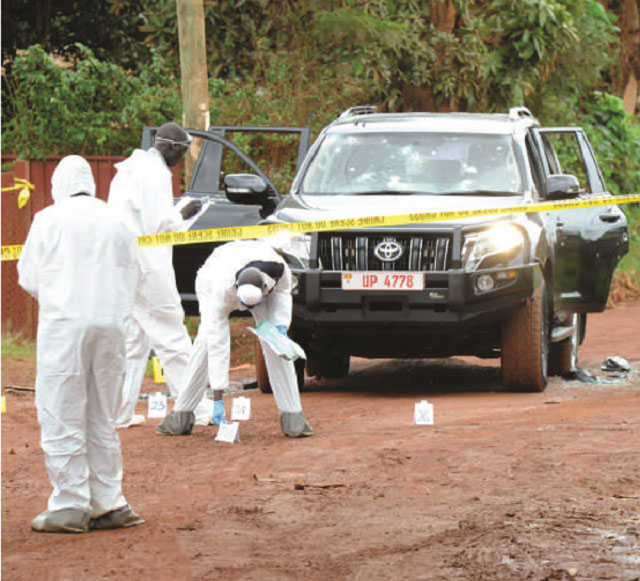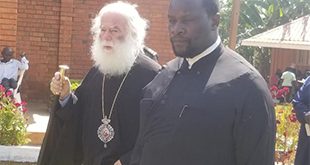
Kayihura in tight corner as Museveni demands progress
On April 21, the Inspector General of Police, Gen. Kale Kayihura, did something unusual. As highly anticipated by the general public, he presented to the Nakawa Magistrates Court in Kampala 13 suspects in the murder of the late force spokesperson, Assistant Inspector of Police Felix Kaweesi.
However, in an unprecedented shift, their lawyers, relatives, journalists and members of the general public were barred from witnessing the proceedings as mean-looking heavily armed security operatives sealed off the court area.
Kayihura’s move caught everyone by surprise because journalists have in the past been allowed in court even when suspects in sensitive security cases, even those involving terrorists, are being tried.
Kaweesi, his bodyguard Kenneth Erau, and driver Godfrey Mambewa were murdered on March 17 when assailants riding motorbikes, waylaid them and sprayed the SUV they were driving in with almost a hundred rounds of bullets.
In the past, in such high profile cases, Kayihura has always rushed and arraigned suspects before cameras. But with this case, he has made a 360 degrees turn. Instead, on April 20, he put more bolts on when he secured a court order blocking certain media houses from covering the case.
Does it mean that the police now see Kaweesi’s murderers as more dangerous than even the terrorists, many are asking.
In answer to this question, speculation is now widespread that the incognito trial of suspects going on is the latest sign that Kayihura is coming under increasing pressure in investigating the Kaweesi murder yet he has nothing substantial to show.
Stakes are high because Kaweesi was the 12th high profile personality to be murdered under similar circumstances and President Museveni is putting the security agencies under pressure to catch the culprits and end the attacks.
The laxity of investigations is also a major concern since the last case in which the government managed to secure successful prosecutions appears to have been the investigation into the 2010 Kampala twin bombings. Kayihura is also under pressure over general deterioration of security in the country.
In addition, as he feels the heat, Kayihura has taken moves that instead of relieving pressure on him have merely added to his troubles and are increasingly putting his actions under negative scrutiny.
The most damning concerns are in regard with how Kayihura is going about the evidence gathering process.
Publicly, Kayihura has put Grace Akullo, the Assistant Inspector General of Police (AIGP) in charge of Criminal Investigations and Intelligence Department (CIID), in charge of the investigations.
Akullo is supposed to coordinate with other security agencies; namely the Internal Security Organisation (ISO), Special Forces Command and the Chieftaincy of Military Intelligence (CMI).
Akullo, however, had been side-lined for over five years and requires time to re-establish her clout on the force, and known or unknown to Kayihura, her coordination role has been frustrated by competition for control of operations and resources around the project.
To get some results, the police have behind the scenes been arresting suspects, detaining them at the maximum security police detention facility at Nalufenya in Jinja. Here, it is alleged, the suspects are being routinely tortured to extract information and forced confessions.
Kayihura has reportedly directed a trusted aide, the commander of Police Special Operations, Nickson Agasirwe, who has just completed a course at Police Senior Command and Staff College in Bwebajja, Entebbe Road, to hunt down and extract confessions from arrested suspects.
The allegations of torture have been made by, among others, human rights lawyer Laudislaus Rwakafuzi who is representing some of the suspects.
“You remember the Wembley of 2000s and how it used to torture people,” Rwakafuzi told The Independent in an interview, “that is what is happening at Nalufenya, it has become a torture chamber. They are arresting people and taking them there to be tortured.”
Rwakafuzi said among those being torture at the detention facility are his clients; one 55-year old Godfrey Musisi, his 42-year old wife Grace Nankya, and their three tenants. They were all picked from their residence in Namugongo, a Kampala city suburb, at about noon on March 23 as suspects in the Kaweesi murder.
“They are there being tortured,” Rwakafuzi said, “Their family members, doctors and even me their lawyer are not allowed to see them.”
Rwakafuzi is frustrated because he has been denied access and by presstime could not confirm that his clients were part of a group of 13 suspects that Kayihura paraded in Nakawa Court.
Information from sources who requested anonymity indicates that the state prosecutor in fact reportedly told the magistrate that investigations were still going on and whoever was paraded before the court as the suspects, are now expected to appear again on May. 5.
Rwakafuzi said presenting suspects in this way is dicey because “once police takes some of the suspects to court, it cannot keep arresting others”. Rwakafuzi says if the police keep arresting people, someone can raise that issue in court and court could be moved to dismiss the case on those grounds.
Rwakafuzi also pointed out that the police’s efforts to extract confessions from suspects, while important, could prove pointless in court unless it is proved the confession was made voluntarily.
“To charge anyone for killing Kaweesi,” Rwakafuzi said, “Police needs overwhelming evidence.
“The problem is that people are forced to make confessions because police is under pressure to show that it is working very hard and is efficient,” he added.
 The Independent Uganda: You get the Truth we Pay the Price
The Independent Uganda: You get the Truth we Pay the Price


